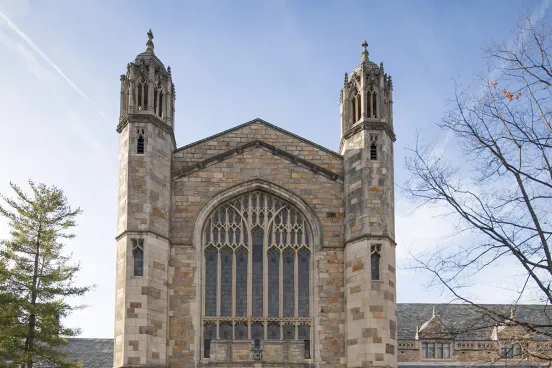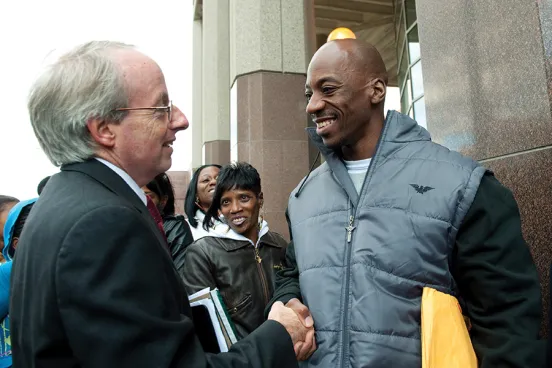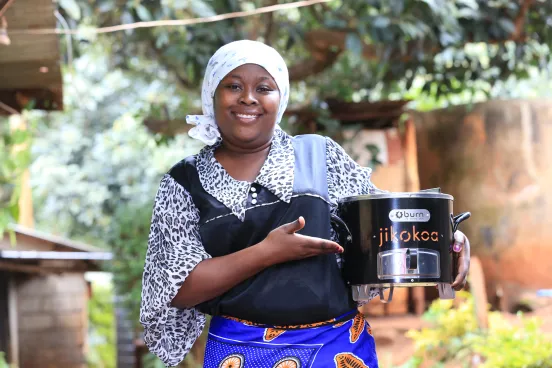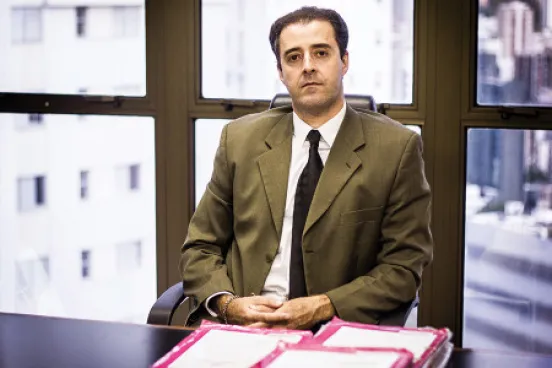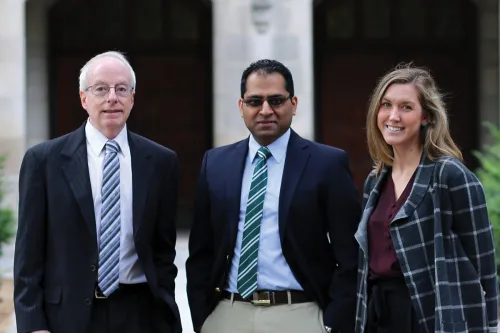
Twenty-two individuals who were wrongly convicted of crimes and served nearly 290 combined years behind bars have been freed thanks to the work of the Michigan Innocence Clinic (MIC). And for Dave Moran, ’91, and Imran Syed, ’11, each new exoneration is as sweet as the first.
“It never gets old,” says Moran, a clinical professor of law and the MIC director. “These cases take years to win, so it’s a big adrenaline rush when we get the exoneration.”
“Each victory means a lot more to me now,” adds Syed, a clinical assistant professor of law and the MIC assistant director, “because I know it not only will help that person and their family but potentially dozens of others who come later.”
The 19 men and three women that Moran, Syed, Clinical Fellow Megan Richardson, ’15, and a team of student-attorneys have exonerated in the past decade were among Michigan’s approximately 40,000 inmates. About 6,000 have applied to MIC for legal assistance since Moran co-founded it in January 2009 with then-Clinical Professor of Law Bridget McCormack, who is now chief justice of the Michigan Supreme Court. Unlike other innocence clinics that specialize in DNA exonerations, MIC focuses on innocence cases where there is no DNA to be tested.
The clinic has an 18-month backlog of applications to review, notes Syed. It will only accept cases if the facts strongly indicate innocence, and if there is new evidence sufficient to reopen the case. “A vast majority of applications won’t make it past the initial investigation, because it’s clear the person did commit the crime or there’s no way forward with the case,” he says. “We’ll investigate about 10 percent of applications, and those investigations can take many years—to locate witnesses, conduct factual and legal research, and build the case from scratch. Only about 1 percent of all applications become accepted cases.”
Moran says the clinic is looking for credible cases where one or more issues that typically result in wrongful convictions are present, including false confessions; bad defense lawyering; prosecutorial or police misconduct, especially withholding evidence; and the reliance on jailhouse informants. Over the years, the clinic has come to specialize in forensic science cases, where forensic mistakes related to fingerprints, fire science, bullet comparison, and medical evidence may be involved. The clinic also has won cases featuring false confessions and faulty eyewitness identifications. MIC recently received a $275,000 U.S. Department of Justice grant to help litigate cases involving questionable forensic science; it previously was awarded a DOJ grant in 2016 to litigate cases involving shaken baby syndrome/abusive head trauma, which is another specialty area for the clinic.
As the work of the Michigan Innocence Clinic and other innocence projects around the world has gained momentum during the past decade, one of the biggest changes Moran has noticed is that fewer people today doubt the prevalence of wrongful convictions, which has led to important criminal justice reforms. “When our system convicts the wrong person, we shut down the investigation and the real perpetrator often will commit more crimes because they got away with the first one,” Moran says. “Everybody realizes that now, but 10 years ago when I was talking to civic groups and state legislators, I felt like I was bashing my head against a wall because nobody believed it. Now, everybody believes it, and it’s just amazing to see how much easier it is to make systemic progress.”
He cites several Michigan legislative changes in recent years that are designed to make the criminal justice system more accurate and transparent and prevent the wrong person from being convicted. They include a collaborative effort among Michigan police, prosecutors, judges, and defense attorneys to develop new standards to make eyewitness identification more reliable; a new “custodial interrogation” law that requires law enforcement agencies to video and audio record statements of those arrested for major crimes; and the creation of a compensation fund for individuals who were wrongfully imprisoned.
Crucial to the clinic’s success are the 20 to 30 law students who enroll in it each year, and whom Syed says work tirelessly on their clients’ behalf. They are involved in all aspects of the cases, from investigating new evidence and researching and writing briefs to arguing court motions and conducting evidentiary hearings. “The advantage of being an innocence clinic at Michigan Law is that every single student brings an amazing work ethic and intellect to the clinic,” says Syed, who got his start as a MIC student-attorney. “They show a passion and commitment to every case, even when it’s going poorly, and understand the importance of doing their best for the client.”
The Michigan Innocence Clinic marked its 10th anniversary in November with a half-day program sponsored by the Criminal Law Society. Guest speakers included Chief Justice Bridget McCormack of the Michigan Supreme Court, who co-founded the clinic, and Barry Scheck, co-founder of the Innocence Project, a nonprofit legal organization that frees the wrongfully convicted through the use of DNA testing.
22
Cases Resulting in the Successful Release of a Client
6,000
Total Applications for Legal Help
283
Combined Years Exonerees Spent in Prison
10
Exonerees Who Served More Than 10 YEARS
20
Accepted Cases Being Litigated
50
Cases Being Investigated




